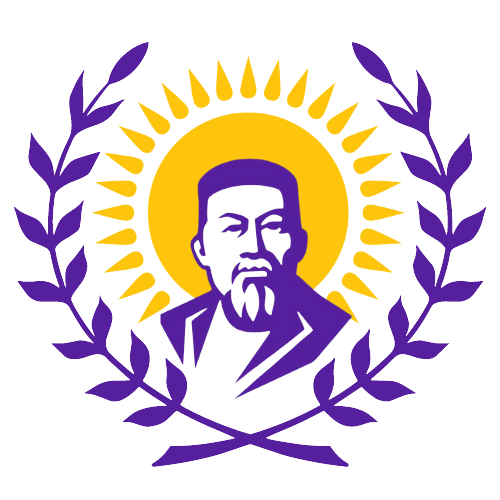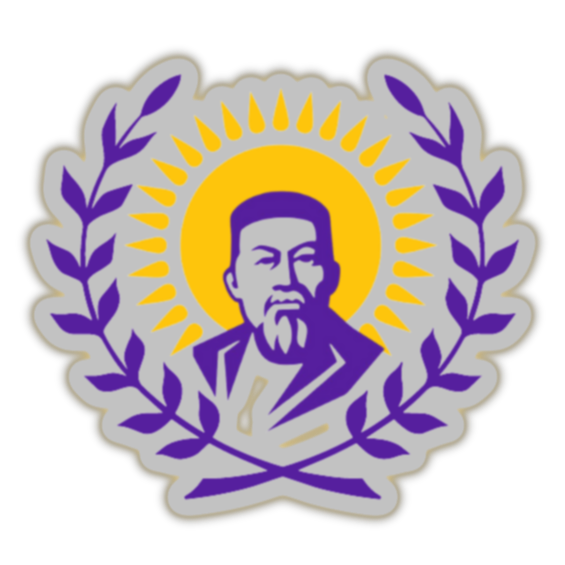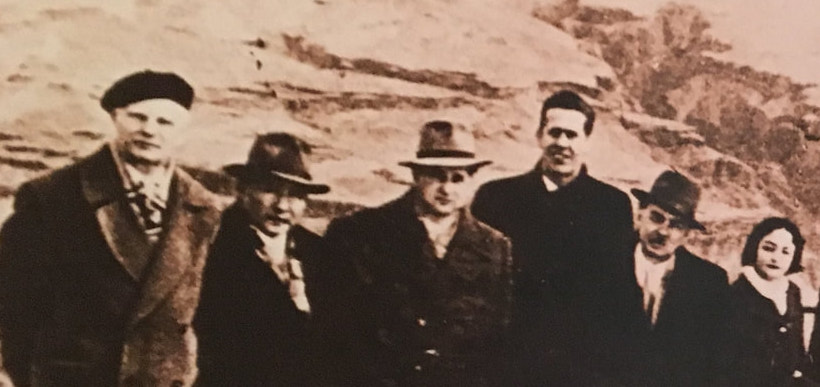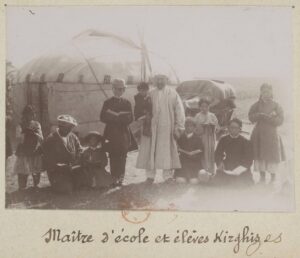
Mukhtar Auezov, widely considered the greatest Kazakh writer of the 20th century for his epic novels and theatrical adaptations, is one of very few Kazakh authors whose work has been translated into English. His masterpiece, The Path of Abai, was published in dozens of languages, and a collection of his short stories was recently released in the UK. Yet there’s one work of Auezov that has never been translated from its original Kazakh, and in a bibliography replete with nomadic folklore, it stands out as one of the writer’s most unusual works. It’s called “Amerıka Áserlerі” – “Impressions of America.”
It turns out that this great scholar and folklorist, who is revered as a literary giant in Kazakhstan, spent a month traveling around the United States in 1960. It was the era of rapprochement known as the Khrushchev Thaw, and cultural exchanges were becoming more frequent. In October of 1959, a State Department program had sent four American writers, Edward Weeks, Paddy Chayefsky, Arthur Schlesinger, Jr. and Alfred Kazin, to the USSR. Half a year later, the American Council on Education sponsored the visit of four Soviet writers in return. Auezov, who had been awarded the Soviet Union’s highest literary honors, was an unsurprising choice. Joining the Kazakh author were the Russian writers Stepan Shchipachev and Leonid Leonov and the Ukrainian writer Oles Honchar. As none of the group spoke English, they were joined by Sofya Krugerskaya, an interpreter and literary critic from Moscow, along with a team from the State Department – John Baker, an escort officer with the Bureau of Public Affairs, Natalie Grant Wraga, a Sovietologist, and a translator named Boris Krawec.
From mid-February to mid-March, Auezov and this ragtag team would crisscross the nation. In Washington, DC, the author gave an interview for national TV and found his own books at the Library of Congress. In New York City, he went to Broadway shows, admired art at the Met, and partied at the 21 Club. In California, he was dwarfed by the redwood trees of Yosemite National Park, and in Arizona, he stood at the edge of the Grand Canyon. Along the way, Auezov and his delegation made headlines everywhere they went. With these news clippings and Auezov’s own notes, we can tell the story for the first time of a Kazakh giant’s journey through enemy lands.
Washington
Auezov was amused when he landed at New York City’s Idlewild Airport (now known as JFK). The name “Idlewild”, he wrote, sounds like aıdyn aýyl, Kazakh for “glassy village.” The size of the airport impressed him – it was as if every airline there had its own airport-within-an-airport. Amazed by the dozens of planes crawling across the tarmac, Auezov compared the scene to an image of “big fish swimming along the seabed.”
They would return to New York City twice on their trip, but now they connected to Washington, DC, where they met with Soviet diplomats at the Embassy of the USSR and held a press conference with fifteen journalists. A year and a half before, when the contentious Soviet writer Boris Pasternak had been awarded the Nobel Prize for Literature, Soviet officials had forced him to refuse the award. Now, journalists wanted to know Auezov’s opinion of his controversial colleague.
Auezov had been warned the question was coming. A Soviet diplomat, Comrade Polyansky, had joked to Auezov that for American journalists, the constant interrogations over Pasternak were like bubble gum – they never swallowed or spit anything out, but just chewed and chewed. In his response to the Associated Press, Auezov was critical. “Why did the Swedes choose Pasternak?” he asked. “There have been great Russian writers whom the Nobel committees ignored. There could have been a Nobel for Tolstoy, but he didn’t get one. There could have been one for Maxim Gorki, a writer who was sympathetic to Russian communism, and approved by our state and people. But he didn’t get one. It was not right to honor Pasternak when these great men were passed over.”
At another point during their stay in Washington, Auezov would be filmed for a syndicated program called “Russian Writers,” hosted by Edward Weeks, the Atlantic Magazine editor-in-chief who had been on the Soviet exchange program the year before. The footage may be lost to time, but it’s almost certain that Weeks pushed the Pasternak issue. In a summary of the program, a TV critic previewed one of the provocative questions posed to Auezov: “Are Soviet authors subject to thought control?”
When Auezov and his team weren’t being grilled as enemy emissaries, they were exploring Washington like regular tourists. At the Capitol Building, they watched a civil rights bill being debated in the Senate. At the Library of Congress, Auezov was presented with his own novels (fifty books a year, he noted, are delivered from Kazakhstan). At the Islamic Center of DC, which had been built just a few years prior, Auezov asked the imam about the call to prayer, and was tickled to learn that it was broadcast over a stereo. For Auezov, a lasting highlight would be a visit to the Folger Shakespeare Library. The Kazakh playwright was the first to translate the bard’s plays (“Othello” and “The Taming of the Shrew”) into Kazakh, and visiting the world’s largest collection of Shakespeare materials was a delightful treat.

New York City
From Washington, Auezov took a train to New York City. The writer would spend two stints in the city, once more at the end of their trip, and it’s not clear from his writings what exactly happened when. Both visits, it seems, were packed with activities. The Soviet writers climbed the Empire State Building, dropped in on the epicenter of capitalism at the New York Stock Exchange, and beheld the Brooklyn Bridge, which they knew from a famous poem by the revolutionary Russian poet Vladimir Mayakovsky. During a visit to the Slavic Department at Columbia University, Auezov was pleased to learn a PhD student had just defended a thesis on Kazakh epic poetry.
After genuinely enjoying the trees and lawns of the American capital, Auezov was at first dismissive of New York’s yawning grey mass. Yet he couldn’t help but be enchanted by the city’s cultural wealth. The Kazakh writer went to not one but two Broadway shows, “The Miracle Worker” (where he learned about Helen Keller) and “The Tenth Man,” written by Paddy Chayefsky (Auezov would also meet Chayefsky personally, as the “Network” screenwriter had been with Weeks on the Soviet sojourn that past October). At the Metropolitan Museum of Art, Auezov was drawn to the works of Richard Lippold, Jimmy Ernst, and Ivan Albright. If he was mostly impressed by this modern art, it was Hollywood cinema that repulsed and entranced Auezov in equal measure. Auezov describes five different films they saw on their trip: “On the Beach,” “Solomon and Sheba,” “Ben-Hur,” “Jack the Ripper” and “A Bucket of Blood.” The last feature, a low-budget horror-comedy about a beatnik who makes sculptures from murdered bodies, was singled out for derision by a scandalized Auezov, who pointedly insisted that Soviet censors would never allow such moral decay to reach their screens.
Much of their time in New York was spent socializing with American writers and intellectuals who either sympathized with socialist politics or advocated for cultural dialogue. At the PEN American Center, they met the Harlem Renaissance poet Langston Hughes, who had traveled through Soviet Central Asia in the 1930s. They had lunch with the Authors’ League of America and visited one of its members, the critic Elizabeth Janeway (“Mrs. Jenway,” Auezov calls her), at her home. They met the poet Carl Sandburg, the detective writer Rex Stout, and the critic Alfred Kazin (another State Department alumnus). Dr. William Hitzig, a peace advocate, entertained Auezov and crew at the swanky 21 Club.
But it was Hitzig’s friend Norman Cousins, the editor of the Saturday Review, who not only invited the writers to his editorial room but brought them out to his Connecticut estate. In addition to advocating for nuclear disarmament, Cousins would become known for promoting something called “laugh therapy,” where extended bouts of induced laughter would be used to treat a variety of ills. The laugh doctor collected bawdy Soviet jokes from Auezov’s companion, Leonid Leonov, that he later published in his magazine, along with an amusing description of the writer from Kazakhstan: “Novelist Mukhtar Auezov, born and raised on the edge of the Gengiz Mountains in Kazakh [Journalists frequently flubbed the name of the republic], has a broad, handsome face which is distinctly Oriental; but you could imagine him as a San Francisco physician who has come to New York to read a paper before the AMA.”
California and Arizona
By March, Auezov and his team of cultural ambassadors had headed out west. At this point, details get hazier – Auezov’s “Impressions of America” essay is actually an unfinished travelogue, covering only his time on the East Coast. To reconstruct the writer’s adventures in California and Arizona, we must turn to clippings from local newspapers.
On their unorthodox route, the delegation spent several days in the mid-sized Central Californian city of Fresno – not usually a major tourist attraction. It could be that Philip Levine, a well-known poet who taught at Fresno State College, was a mutual acquaintance. Along with two other Californian academics, Levine joined the authors for a roundtable written up in the school paper, The Collegian. As usual, it was the gregarious Leonov who seemed to dominate the discussion, while the humbler Auezov sat mostly in silence. Auezov, apparently, grew most animated when talking about the harvest at his dacha. As the Collegian reported in their review of the roundtable, “Auezov, a distinguished Kazakh scholar and folklorist, dropped his usual impassivity when discussing the size of his apples and seemed like any other backyard gardener.” Auezov spent most of his life in Almaty, a city known as the birthplace of the apple, so his enthusiasm for his orchard was typical.
The paper also noted the Soviet writers’ easygoing itinerary: “The writers saw what they asked to see, sometimes on the spur of the moment: a drive-in movie, a supermarket, a department store, a high school, farms, private homes, Yosemite National Park.” Indeed, one of the few photographs available online from Auezov’s adventure is of the author, looking dapper in a peacoat and a fedora, dwarfed by the trunk of one of Yosemite’s legendary redwood trees. The awe he must have felt walking through the park’s grand forests (or amongst the well-stocked shelves of an American supermarket for that matter) remains tragically undocumented.

On March 3, the scribes left for LA, where we know they visited a university (most likely UCLA) and held a press conference at the Chapman Park Hotel on Wilshire Boulevard. Faced for the first time, quite probably, by hostile journalists, the Soviet figures often became defensive and accusatory as the questioning proceeded. Auezov was the eldest member of the delegation, but the quieter Kazakh and the Ukrainian Honchar seemed to defer their answers to Stepan Shchipachev, who had been designated the group’s spokesman. A story in the LA Times the next day quoted an irritated Shchipachev scolding his American hosts. “We publish far more American writers in Russia than you do Russian writers in America,” he boasted. A week later, the LA Times was apparently forced to publish a retraction of sorts. Shchipachev’s accusation, they wrote, “is based on misinformation. Have the Russians forgotten how many months ‘Dr. Zhivago’ was on our best-seller list? Or that Chekhov, Dostoevski, Tolstoi, Turgenev and Gogol are required reading in many university drama, short story and novel classes?” Despite the good intentions of the Thaw and its cultural exchange, it was clear that relations were still quite frosty.
The next week, the team was off to Arizona, where Auezov visited the Grand Canyon and was given a tour of Taliesin West, Frank Lloyd Wright’s masterpiece of Southwestern architecture. A reporter joined Auezov on the ride back to town and shared an endearing moment from their chat in the back seat: “Auezov, riding in a car with this reporter, pointed to a mountaintop estate and asked what it was. Told that it was the ‘Wrigley home,’ he said ‘Oh, a capitalist.’ He smiled when told that everyone is a capitalist or potential one in America. Auezov interjected in his comments on America’s good living that his grandson had asked him to ‘bring back a Chevrolet and a Cadillac.’” Not immune to pride and ideology, a Phoenix paper used the anecdote to illustrate the superiority of the capitalist system. “There are some private cars in Russia,” the paper noted, “but they are hard to come by and harder still to operate.”

Boston, New York, and Back Home
Initial reports in the Associated Press suggest that Auezov had planned to go to New Orleans, but it’s not clear from his writings whether they ever made it to the Big Easy. The crew did make it to Boston, where we know they visited Harvard University and were introduced to John P. Marquand, a well-known satirist and Pulitzer Prize winner, by their friend Edward Weeks. And they did make it back to New York, where we know they met the venerated American poet Robert Frost. These brief details were provided by Shchipachev to the Moscow Times, the English-language propaganda journal that wrote up a heroic account of the men’s visit upon their return.
The trip was by all means historic, but today’s scholars have generally overlooked its importance, perhaps discouraged by the lack of primary sources. Here was Mukhtar Auezov, perhaps the greatest Kazakh cultural figure of the 20th century, cultivating Soviet soft power in the very belly of the American beast! Yet scenes from this grand adventure come only in vignettes: a stumbled-upon news story in an online archive, or a black-and-white photograph spotted at the author’s childhood home-turned-museum. A year after Auezov’s journey to the USA, the giant of Kazakh letters died tragically in Moscow during an operation to remove a cancerous polyp. His “Impressions of America” were left unfinished, his life’s last great story left untold.
Next year will mark the 60 year anniversary of Auezov’s death, and Auezov scholars will be eager for a way to honor his memory. Perhaps this final chapter in the author’s tale is one that can receive some attention. Surely, there is more we can learn. Auezov’s personal correspondence might yield some clues, or maybe there is a family photo album. And surely, it must be possible to translate “Impressions of America,” at long last, into a language that will reach a broader audience. Americans, I think, would find it an irresistible story: a man named Mukhtar from the Genghis Mountains, who wrote epics of the steppe and found them in the Library of Congress.









